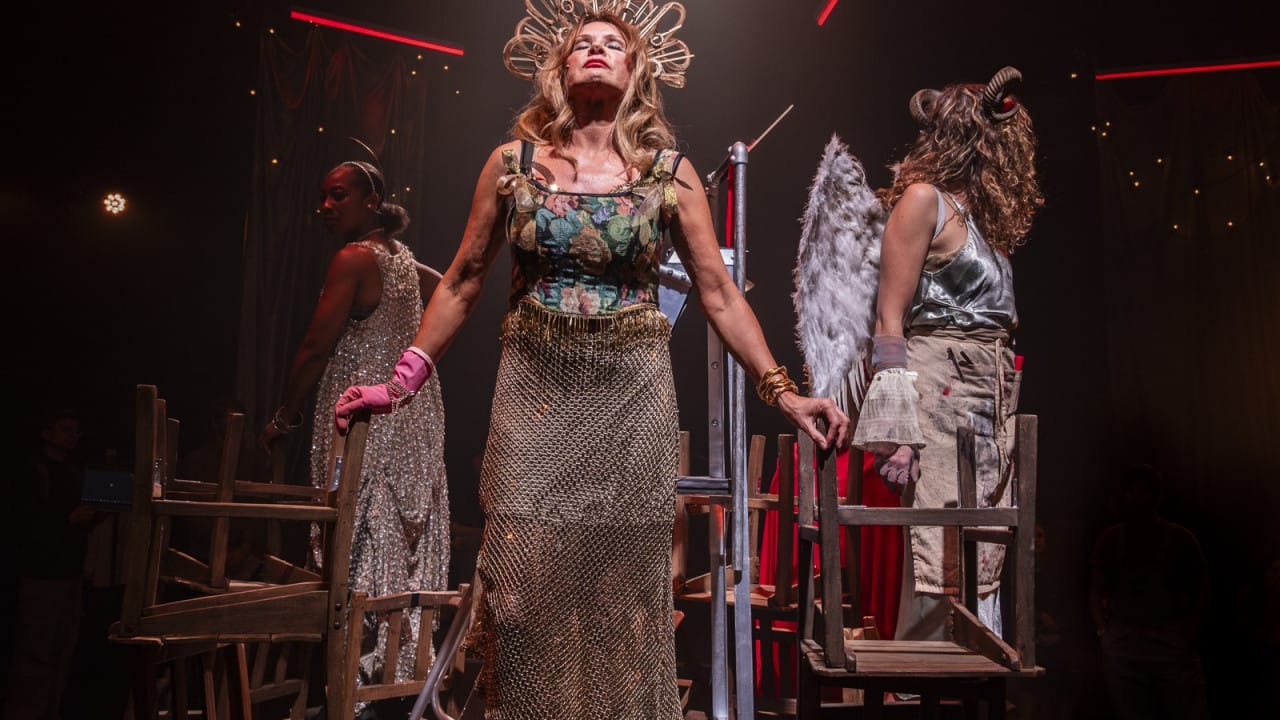Every theatre piece establishes a temporary community, especially during its creation process. For the piece to come to life, everyone must work towards its realization. Synchronize schedules, pacify egos. It requires fluidity and rigor in a very specific dynamic. When I say community, I’m not necessarily referring to a peaceful bond or harmonious coexistence. To me, community means living together, suspending aspects of one’s own life, putting certainties to the test. I also believe there are pieces that are not committed to any of this.
It might seem incongruous to think of the temporary and the notion of community simultaneously. It may sound overly passionate to attribute all this to a play. But the driving force has always been the connection with passion. Rethinking the very foundations of what theatre can be. What one desires from theatre. Driven by these impulses, I spent 45 days living in another country, speaking a different language, dedicating myself entirely to creation. This, in itself, is an experience of displacement.
The invitation to join the process of Trials and Passions came through my long-standing partnership with artist Janaina Leite. LIFT proposed this creative match between Janaina’s poetic vision and the work we developed together, and the theatre company Clean Break. It was a risky proposal, not only because of cultural and aesthetic differences, or what is lost in translation between Portuguese and English, but also because of the profound differences in how trauma, identity, and violence are handled. Can differences be celebrated? Is it possible to establish a dialogue where no perspective dominates?
We held a workshop in February of last year, and it was during this time that we met Athena Maria, Kim Teresa, Dominique Lavine, Sarah Jane Dent, and Yvonne Wickham. The process continued between research and creation for over a year, during which we explored online possibilities, leading us to return the following February for another creative immersion, and then to the premiere in London as a part of LIFT 2024.
During the online process, in partnership and under the guidance of Rachel Valentine Smith, each member of the group developed their Scrapbook: with collages, writing exercises, thoughts, images, etc. I am very interested in creating from the limits of language. In that non-hierarchical space between what is and what is not worthy of dramaturgy. Or who or what defines dramaturgy. In this gray area, a mythological creature and a piece of your brother’s hair can have the same scenic vigor. A fragment of Shakespeare, a WhatsApp message from your daughter, side by side. The poetic power of materials lies in the arrangement we make with them.
Living with these women, witnessing their epiphanies and sabotages, their moments of joy and panic, courage and fear, and feeling the contributions that were possible for each during the creation of the play is something that deeply moves me. Each one inhabited my nights of sleep, the words I write, the thoughts that invade my mind at the most inconvenient times, in different ways. And today I feel “saudade”* for them. That wonderfully untranslatable word. And all that was impossible to translate, but will certainly continue to resonate in my ways of creation. The experience of creating and being a foreigner in a country is, to the same extent, something extremely vulnerable and something extremely renewing.
* “Saudade is a word that only exists in the Portuguese language. It comes from the Latin ‘solitas,’ which means ‘solitude.’ It expresses a deep feeling of nostalgia, longing, and melancholy.”
I kept thinking about how a national identity is fundamentally composed by those who migrate. It has much less to do with what the person brings with them, and more with the habits that transform and remain, informing who was and who stayed, who we are together.
One day between rehearsals, resting in a park, I stumbled upon a Latin festival. Obviously, there’s something lucrative in the export of the funk-reggaeton tent… But it’s curious to see the meeting of these two rhythms. It’s enjoyable to dance. And if everyone came from somewhere and composes so sumptuously this crazy city, I must have come from somewhere too…
London is a city where 40% of the population are immigrants. There are more immigrants than English people. (Not very different from São Paulo if you consider the diversity of states in the country)… Every very large city has something similar. But it deepens.
And it is this multitude of people who come here to work with the most precious aspects of the city. Without immigrants, what remains? On what does the identity of a people rely, if not on exchange?
When I visited the British Museum, I was confronted with the contradictory sensation of admiring these colonial museums. All the power struggles are preserved and cataloged. And I navigate well-behaved with my little map in hand. There’s nothing that unifies humanity beyond war.
But then I found a room about “Ordinary Life in Ancient Egypt,” the belongings of those who were not kings. Another room about China. Etruscan Empire. Mesopotamia.
Infinite.
Humanity has been decorating itself with adornments, embellishing ceramics, decorating the body… Since forever, inventing utensils for eating. Creating gods, meanings for death. Elaborating masks and wars. And also ordinary days of peace.
A mother nursing a child
A Buddha that transforms sexual desire into spiritual learning
A glass of water
A vinyl shop
Deciphered hieroglyphs
And finally, here I am. Drinking coffee, rehearsing a play, and holding this alphabet.
Almost like a ghostly presence, I think of each one of them, of each unfamous woman. I recall the spotlights that woke me up at the end of each performance. They, in backlight, going against the flow, and me momentarily blinded, as when I look directly at the sun.
May passions and communities, even if temporary, be aware of their own brilliance.
Written by
Lara Duarte
Images of the show



